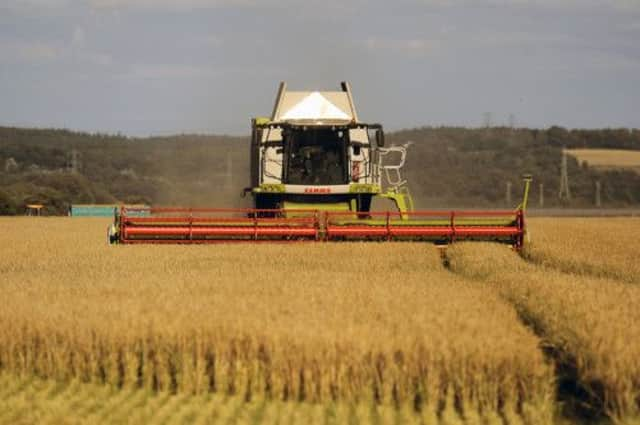Scotland must capitalise on rural affairs


For Ewan McNair, it is a career change, for Robbie McGowan it has been a dream since he was ten, Bernadette Charter wants to get involved and not just watch, while for Finlay Ross it has meant awards and raised expectations. Despite being from non-farming backgrounds, all four are studying agriculture at Scotland’s Rural College (SRUC). They have joined a growing group who believe once again that food production and land management offer challenging, relevant and rewarding careers.
As Principal of SRUC, with over 30 years of research and teaching experience in the sector, I have never been so optimistic about its future.
Advertisement
Hide AdAdvertisement
Hide AdWe all know the headlines: nine billion people to feed within the lifetime of our present students, but from less land, fewer natural resources and without harming our environment. It demands all kinds of skills, from hands-on farming to food processing, from pest and disease control to health and welfare research, economics, marketing and engineering – the list is endless.
Ex-RAF engineer Ewan, 46, from Nairn, recognised local farmers are getting older and saw a new opportunity for someone with his existing skills, topped up by a one-year HNC Agriculture course at our Craibstone Campus in Aberdeen. Stirling-based Robbie, 18, has begun a degree course with us in Edinburgh. His childhood dream of becoming a farm manager began with summer holiday farm work. Surrounded by farming in Orkney, Bernadette, 18, wants to get involved but lacks the skills so has started an HNC at our Oatridge campus. Finlay, 22, also began with an entry-level course at Oatridge but progressed to HNC and two Learner of the Year awards. Now working part-time on a farm, Finlay is studying for a Higher National Diploma.
That opportunity for staged progression, from entry level to PhD is now possible following the merger last year of Barony, Elmwood and Oatridge further education colleges with the Scottish Agricultural College. I have first hand experience of progression, having started my studies at college and ended up with a PhD.
Renaissance of interest in agriculture
Ewan, Robbie, Bernadette and Finlay are just four of around 8,000 students and 500 modern apprentices learning at SRUC’s six campuses across Scotland. Alongside the spread of other courses linked to the rural sector and science, the renaissance of interest in agriculture gathers pace, helped where required by an SRUC Going Further Bursary, to encourage and reward students with exceptional advancement potential.
Our structure makes SRUC unique in the UK and one of the largest organisations of its kind in Europe. A £17 million-a-year research programme is gaining new knowledge in fields such as animal and plant disease control, animal welfare, food supply chains, biodiversity, climate change and the health of rural communities. In addition to teaching students, we spread the knowledge directly to 12,500 subscribing farmers and other land-based businesses and organisations via consultancy work across Scotland and northern England.
This integration of research, education and consultancy, known as “the Scottish model”, is admired around the world. Fortunately, current and previous Scottish ministers have recognised the importance of agriculture to the Scottish economy and given it a higher profile than – until recently – has been the case south of the Border. It has helped sustain the Scottish model and puts SRUC in a prime position to capitalise on the renewed interest in farming and rural careers.
Independent research has predicted Scotland alone will need 3,000 qualified rural workers a year between now and 2020. SRUC is ready to make the most of the new opportunities and play its role.
However, while student recruitment remains strong, meeting this demand will require the funding for additional student places and raising student number caps.
Advertisement
Hide AdAdvertisement
Hide AdMeanwhile we cannot stand still. As the industry’s needs evolve, we must adapt our training and education accordingly. For example, we have established a new land management degree course for Scotland, accredited by the Royal Institution of Chartered Surveyors, and we now offer distance learning courses in subjects like organic farming and poultry management for those needing to work while studying.
A sector with a real future
Ewan, Robbie, Bernadette and Finlay appreciate that flexibility. As their confidence and aspirations grow with their increased knowledge, they recognise their training and education needs will change.
“The goal posts always seem to be moving”, says Ewan. “Sometimes weather, sometimes markets or disease. There is always a challenge and that can be exciting.”
Finlay may come back for further qualifications, but just now his sights are on achieving his diploma and getting stuck in: “I am excited by the opportunities agriculture offers. It is a sector with a real future and I want to be part of it.”
New blood like Ewan, Robbie, Bernadette and Finlay are making their way in their chosen careers. SRUC, with its unique blend of services, will always be there to assist.
• Professor Bob Webb is principal and chief executive, Scotland’s Rural College
SEE ALSO